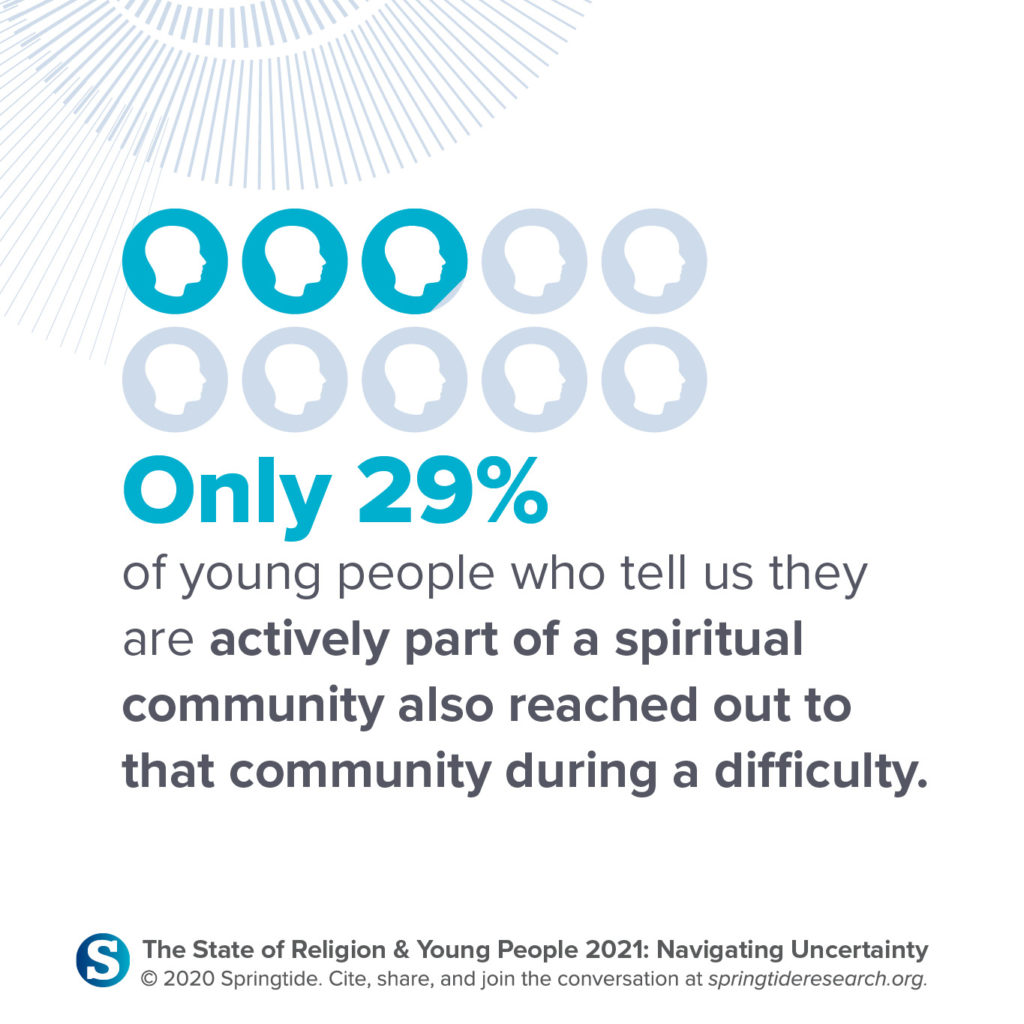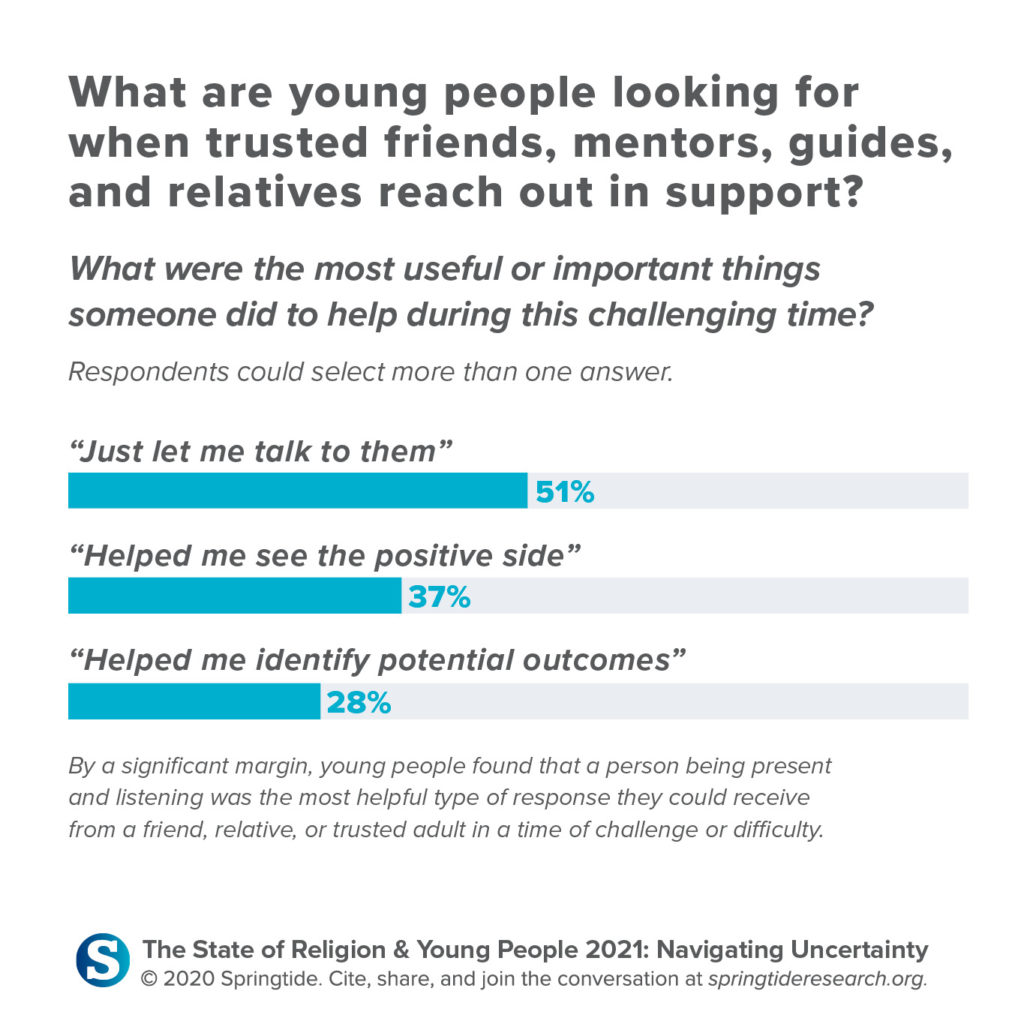
By Sam Ludlow-Broback
Who do you go to when you are in need? When life is moving a million miles an hour or when a big change happens, who do you reach out to?
Odds are, the person you are thinking of has gained your trust and demonstrated to you that your relationship is valuable to them. This type of relationship is precisely what Generation Z is telling us they desire but are not experiencing with faith leaders. What can today’s pastors do to gain their trust?
Springtide Research Institute interviews today’s young generation (Gen Z), ages 13-25, to understand how they interact with religion. The findings from this research, illustrated in The State of Religion & Young People 2021, can enlighten church leaders to the pressing questions Gen Z is asking regarding their relationships with religious institutions and faith leaders.
Just 3 in 10 young people (29%) who say they are actively part of a religious/spiritual community chose to reach out to that community during a difficult or challenging time, according to Springtide Research. Click To TweetA major theme of the report is that young people are facing uncertainty in their lives. In fact, 1 in 3 young people claimed they were currently experiencing a challenging event. Furthermore, by and large, young people said they turn to trusted relationships to help them navigate uncertain times and challenging events.
Unfortunately, those trusted relationships are rarely found within faith communities.
Despite a majority of young people identify as religious (71%) or spiritual (78%), just 3 in 10 young people (29%) who say they are actively part of a religious/spiritual community chose to reach out to that community during a difficult or challenging time. Where is this disconnect coming from?

While there is no singular formula to fix this issue, church leaders can begin by focusing on providing what young people rarely experience with older adults: a listening ear.
Gen Z strongly desires to be heard, especially during uncertain times. More than half of young people (51%) say the most important thing a person did to help them during uncertainty was to just let them talk.

Ally, a high school senior, has several adults she can talk to. At the heart of these relationships is what she describes as wholehearted trust.
“I talked to my mom about it. I talked to my therapist. I talked to my college counselor and some advisors at my school that I trust wholeheartedly,” Ally said. “With these kinds of decisions, no one can make them for me, but I like having feedback from others who care.”
More than half of young people (51%) say the most important thing a person did to help them during uncertainty was to just let them talk, according to Springtide Research. Click To TweetYoung people thrive when they engage with trusted adults who care for, listen to, and guide them. Young people need faith leaders who meet them amid the messiness of the present moment. But the research found a majority of young people (54%) agree that “religious communities try to fix my problem instead of just being there for me.”
There are a variety of other factors that go into building a trusted relationship between a pastor and today’s young people. Many of these can be found in The State of Religion & Young People 2020, where Springtide Research found that establishing relational authority goes a lot further toward gaining trust with young people than institutional authority.
Young people do not come to trust faith leaders because of their credentials, titles, or years in ministry. Young people need to feel they are cared for through relationships before they can trust the authority of others in their lives. They need to be heard, to build a relationship slowly over time, and to trust that their mentors believe in them and care for them. Once this trust is built, faith leaders can address the religious disaffiliation that is happening among young people.
Young people need to feel they are cared for through relationships before they can trust the authority of others in their lives. — Sam Ludlow-Broback Click To TweetListening well, a critical piece of relational authority, is an art form. It is not just about uncrossed arms or nodding along but about witnessing a young person express something, possibly for the first time. Spend time actively practicing the art of listening by withholding immediate advice when someone shares about the challenges they are facing and instead demonstrating genuine curiosity for who they are and who they are becoming.
This approach might require church leaders to shift their mindsets from preacher to listener in relationships with young people. Similar to when Jesus washed His disciples’ feet, faith leaders today need to hear the needs of young people in order to connect with them and build a relationship of trust. When young people receive this gift of listening, trusted relationships can begin to flourish.
Sam Ludlow-Broback
Sam is a media and public relations intern for Springtide Research Institute and a recent graduate of Saint John’s School of Theology and Seminary, where he received a Master’s in Systematic Theology.








